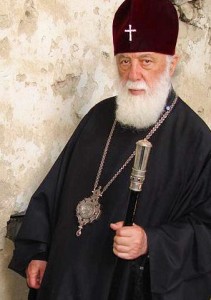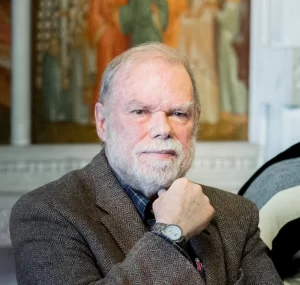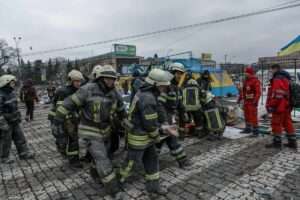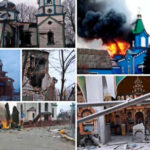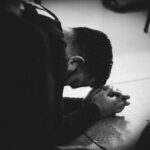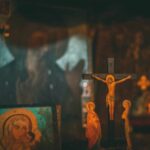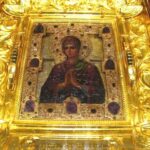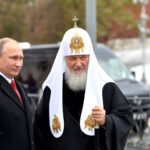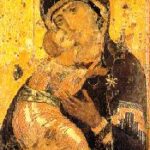News: Summer 2008
![]()
Belarus pressures Orthodox not to venerate martyrs
Belarus is discouraging the commemoration of Orthodox Christians killed for their faith by the Soviet Union, according to a report issued in May by Forum 18. The Belarussian KGB sought to have icons of the New Martyrs removed from the cathedral in Grodno.
New Martyr St. Pavlin, Bishop of Mogilev, shot in 1937 Deacon Andrei Kurayev charged that KGB officers had asked Grodno clergy "why they were inciting the people in such a way."
Bishop Artemi (Kishchenko) of Grodno and Volkovysk refused to take the icons down. "He told the KGB that he couldn't rewrite history."
During the 1920s and 30s, over 20 Belarussian clergy, including three bishops, were shot in Minsk for their faith, according to Fr. Feodor Krivonos.
"There is a certain circle of people who don't like these icons," said Fr. Aleksandr Veliseichik. He said icons would be removed only if they were not Orthodox, "but these were painted entirely according to church canons."
Some of the icons, he said, were copied from originals in Moscow's Cathedral of Christ the Savior. One of the icons is of St. Pavlin, Bishop of Mogilev, shot in 1937.
KGB officers also often monitor visitors to Kuropaty, where many New Martyrs are buried in mass graves. Possibly 100,000 victims of Stalin's purges are thought to have been shot at Kuropaty in between 1937 and 1941, but no archaeological research has been conducted at the site since the 1990s.
The act of going there is "fraught with tension" with the current Belarusian regime, said an Orthodox Christian who asked not to be named. An Orthodox chapel planned for the site has never been built.
The Moscow-based St. Tikhon Orthodox University estimates that 90,000 Orthodox were killed for their faith by the Soviet state.
Over 1,000 New Martyrs were formally canonized by the Russian Orthodox Church in August 2000.
[F18 News, 12 May 2008]
Russia seeks to draft priests into the army
[singlepic=17,320,240,,left]
The young priest was not intimidated by the words "criminal case" and the green file that the officer said would land him in jail for refusing the draft. He was articulate and patient as he stood, wearing a cassock and cross, in front of a colonel at his district military commission, trying to persuade him that as an Orthodox priest there is no way he could serve as an army recruit. The priest, who asked to remain anonymous, serves at one of the city's largest churches.
Following the February passage of a law that for the first time makes Orthodox priests subject to conscription, all draft-age Russian priests find themselves torn between a legal obligation and their religious obligations.
It is a serious dilemma. The Orthodox Church forbids priests, on pain of being defrocked, from carrying guns or being involved in military activities, while the law threatens them with imprisonment if found guilty of refusing the draft.
"The officer gave me a sour look and asked what village I was from, but that initial bravado disappeared when he saw that I was honest, respectful, and serious," the priest recalled. "Soon I saw he was baffled. He even rang his superior in my presence to ask what he should do."
In the end, the officers made a joint decision to let the priest go, but his battle might not be over, as the spring draft continues for two more months. "I'm prepared to have as many conversations with the officers as it takes," the priest said. "I believe in the power of the word."
Colonel Yury Klyonov of the Leningrad military district says the presence of priests in the army is bound to improve the moral climate among recruits. "This new measure is going to be beneficial for both the church and the army. After all, the Orthodox Church has always supported the idea of serving the motherland."
"If priests are to be conscripted at all it must be only as chaplains," said Archpriest Dimitry Smirnov of the Moscow diocese. "They must be allowed to fulfill their duties without having to compromise and betray their beliefs." But the position of chaplain does not exist in the Russia armed forces.
Xenia Chernega, a lawyer representing the Moscow diocese, said the law was "a sign of blatant disregard for the canons of the Orthodox Church. The restriction is set by apostolic rule number 83: 'anyone exercising military activities must be expelled from the priesthood'."
The St. Petersburg Legislative Assembly has appealed for the amendment to be vetoed. "Breaking into churches and dragging priests off to the army would be shameful. As a political successor of the USSR, Russia is still greatly indebted to the priests who perished in Stalin's purges," said one of the authors of the appeal, Vitaly Milonov.
In response to such criticism, Nikolai Pankov, the Deputy Defense Minister and one of those who instigated the changes in the conscription rules, accused critics of a "lack of patriotism" and of failing to support Russia's defense needs. He and others argue that serving the motherland does not conflict with religious beliefs. One of their arguments is that drafting priests will help to reduce the bullying and brutality for which the Russian army has become notorious.
"Several thousand young men desert the army every year because they cannot bear the humiliation, beatings, and extortion of money by the senior recruits," said Ella Polyakova, chairwoman of the St. Petersburg pressure group, Soldiers' Mothers.
She believes the move was meant to send a tough message. "Russia has become a police state. True to its name, it has to constantly remind the people who's boss. The other amendments are equally repressive. Just think about a young man having to leave a sick mother confined to her bed or a breast-feeding wife with no income. The authorities openly show that they see our citizens the way feudal lords saw their serfs." [St. Petersburg Times, 29 April 2008]
'Instant' churches to ease church shortage in Russia
A group of Russian Orthodox benefactors has found a way to ease the continuing post-Soviet shortage of places of worship by devising a plan to provide prefabricated churches that can be erected in 24 hours.
A prototype is now in place at Kemerovo in Siberia, where church shortages are most acute, said Vasily Smirnov, director of the Russian Club of Orthodox Philanthropists.
"Communism changed the Russian landscape by introducing neighborhoods filled with towering apartment blocks, but because of official atheism, they almost never had churches," Smirnov said. "In densely populated bedroom communities, there aren't enough Orthodox churches and residents have to travel to the town center. We're developing some innovative techniques in this sphere for people who want to build churches."
The buildings, able to accommodate up to 200 people, will be erected in large numbers once the project gathers pace.
The Russian Orthodox Church opened more than a hundred churches and chapels in 2007 in Moscow, where a further 86 are under construction. However, Russia's 142 Orthodox dioceses and 27,942 Orthodox parishes still have only a third of the churches the country had before the Bolshevik Revolution in 1917. [ENI, 7 May 2008]
Danger of War in the Caucasus warns Patriarch Iliya
War could erupt in the Caucasus unless Russia and Georgia take affirmative steps to reduce tensions, Patriarch Iliya II, Patriarch of Georgia's Orthodox Church, warned in April. He stated the border dispute between the two former Soviet republics, Abkhazia and South Ossetia, was in danger of spiraling out of control. He called on Patriarch Alexy of Moscow to join him in using "the role and authority of our churches to prevent the escalation of tensions and help restore good bilateral relations."
Abkhazia and South Ossetia, two northern regions of Georgia, broke from the Tbilisi government following the collapse of the USSR. Georgia has not relinquished sovereignty, but has been unable to put down the Moscow-backed secession.
Four days before Iliya's appeal, Russia announced it would strengthen its economic and cultural ties to the two breakaway regions and provide "complete protection" to Russian citizens resident in the country. Moscow had previously granted Russian citizenship to residents of Abkhazia and South Ossetia.
"The current condition of the bilateral relations," said Iliya, "fails to meet the spirit of neighborliness and fraternity of the two peoples. Both sides have made mistakes in their attempts to normalize interstate relations.... I fear that the bilateral relations may reach a critical limit and plunge into uncontrollable processes.... We think that any confrontation, armed conflicts or military actions are unacceptable, because they will lead to irreversible consequences. That is why we think that regardless of the difficulties of launching negotiations in the present-day tense situation, there is no alternative. A peaceful dialogue is the only way out of the current situation."
Church restoration in Kosovo to resume
The Serbian Orthodox Church has decided to resume the restoration of destroyed monasteries and churches in Kosovo. The restoration will continue in cooperation with the Culture Ministry, international institutions and the UN.
At the conclusion of its spring meeting, the Synod stated that the Church and the Serbian people would never countenance the unlawful, violent usurpation of Kosovo, and thanked all the countries that had not recognized the province's unilateral independence declaration. [B92, 22 May 2008]
Serbian Orthodox Church relieves Patriarch Pavle
The Synod of the Serbian Orthodox Church announced in May that 93-year-old Patriarch Pavle would no longer head the church because he is too ill to perform his duties. The synod will take charge of the running of the church, while the oldest bishop, Amfilohije, will act as president of the synod and "Guardian of the Throne," it was announced. Pavle, who became leader of the Serbian Orthodox Church in 1990, has been in and out of hospital over the past two years.
Serbian Orthodox church law states that a successor to the Patriarch must be elected by a secret vote during a gathering at which at least two-thirds of the 40 bishops attend. If two candidates receive the same tally of votes, a patriarch is chosen by the drawing of lots. [ENI, 19 May 2008]
Iraqi bishop urges pressure on US to keep its 'broken promises'
An Iraqi Christian leader has appealed to US churches to pressure their government to keep promises made to Iraqis to improve humanitarian conditions after the 2003 US-led invasion.
"There is a tragedy in Iraq now because the promises made were never kept," said Archbishop Avak Asadourian, primate of the Armenian Church of Iraq, during a meeting in June in New York. Asadourian is the current general secretary of the Council of Christian Church Leaders in Iraq.
He lamented that though Christianity has deep roots in Iraq, war is slowly depleting Iraq of its once-vibrant Christian communities. Christianity came to Iraq in the first century, when St. Thomas the Apostle is said to have visited Mesopotamia.
"Our natural resources, which are tremendous, must be utilized for the betterment of the Iraqi people," said Asadourian. "Until now, the infrastructure in Iraq is in shambles, and people are still waiting for basic necessities, so they may live in a normal fashion. We were promised clean water but what we got is Blackwater" (a US-based private security firm that has played a notorious role in Iraq).
Asadourian described Iraq as "a severely wounded country," with Iraqis living "under the strain of several hardships stemming from so many wars." These included, the archbishop said, a 13-year US-led international embargo, "which in and of itself is an act of war" and which was in place before the invasion in 2003.
The 2003 occupation brought with it hope that conditions might improve in Iraq. Instead, Asadourian noted, the occupation had led to five years of terrorism, forcing tens of thousands of people, many of them Christian, to flee Iraq.
"People are aware that they can leave home alive and never return to their families," Asadourian said. "My cathedral closed for a year and a half because of the lack of security," he said. "What Iraqis need, before anything else, is security."
"It is very difficult to live under the shadow of death for so many years," the archbishop said. "It takes its toll on you."
Until the military action in 2003, Christians accounted for roughly 3 per cent of Iraq's 29 million people. Approximately 70 percent of the Christians belong to the Chaldean church, which follows the ancient Chaldean rite but is in union with the Catholic Church.[ENI, 18 June 2008]
Armenian spiritual leader decries Turkeys' genocide denial
Catholicos Karekin II, leader of the Armenian Apostolic Church, visiting Pope Benedict XVI in Rome in May, spoke of the genocide suffered by his compatriots in the Ottoman empire, and said that those with power should ensure that justice prevails.
"We appeal to all nations and lands to universally condemn all genocides that have occurred throughout history and those that continue through the present day," Karekin said in St. Peter's Square on 7 May, where he had been invited by Pope Benedict to speak at a general audience. "The denial of these crimes is an injustice that equals the commission of the same."
"Today many countries of the world condemn the genocide made by the Ottomans against the Armenian people, as John Paul II said when I was in Rome," noted Karekin.
"The recent history of the Armenian Apostolic Church has been written in the contrasting colors of persecution and martyrdom, darkness and hope, humiliation and spiritual re-birth," said Pope Benedict.
Armenia estimates 1.5 million of its people died between 1915 and 1923 in a systematic genocide initiated by the Young Turks' government ruling then in Istanbul. Turkey rejects the term "Armenian genocide," claiming that mass removals were intended to clear people from a war zone. It acknowledges that people died, but holds that the number was far less than that given by Armenia. [ENI, 13 May 2008]
Food crisis 'artificially imposed' says Kenyan theologian
The roots of the global food crisis that has led to soaring prices for basic foodstuffs are to be found as much in political as in economic factors, Professor Jesse Mugambi, a Kenyan academic, charged in May. Mugambi, who teaches religious studies and philosophy at the University of Nairobi, belongs to a church environmental network.
"The rise in price is not only because of decline in supply," he said. "It is artificially imposed by rises in fuel costs and other constraints more political than economic."
He said there could be no short-term solution to a long-term problem. "The long-term solution is equity, not charity. Equity is based on long-term investment."
"Food prices have soared, without an improvement in personal and family income," he said, adding that "current international economic and agricultural policies discourage Africa from growing staple foods in favor of cash crops. Africa is the only continent which produces what it does not consume, and consumes what it does not produce. Tropical Africa has some of the best soils for agricultural production in the world. Why should those soils be used for the production of non-staple agricultural commodities, while some of its people go hungry every day?" [ENI, 9 May 2008]
More than half of US firearm deaths are suicides
Suicides accounted for 55 percent of America's nearly 31,000 firearm deaths in 2005, the most recent year for which statistics are available, CNN reported on 30 June.
Gun-related suicides outnumbered firearm homicides and accidents for 20 of the last 25 years. In 2005, homicides accounted for 40 percent of gun deaths, accidents for 3 percent and 2 percent either for "legal killings," such as when police do the shooting, or cases involving undetermined intent.
Public health researchers have concluded that in homes where guns are present, the likelihood that someone in the home will die from suicide or homicide is much greater. Studies have also shown that homes in which a suicide occurred were three to five times more likely to have a gun present than households that did not experience a suicide, even after accounting for other risk factors.
More than 90 percent of suicide attempts using guns are successful, while the success rate for jumping from high places was 34 percent. The success rate for drug overdose was 2 percent.
Israeli human rights group warns of grave West Bank water shortage
An Israeli human rights group anticipates a serious water shortage in large areas of the West Bank, the territory Israel occupied in 1967, as a result of what the group says is the most serious drought in the area in the past decade and Israel's "discrimination in [the] division of water sources."
B'Tselem, the Israeli Information Center for Human Rights in the Occupied Territories, said, "The shortage will have serious repercussions on the economy and the health of tens of thousands of Palestinians." The shortage, they said, was the consequence of "unfair distribution of water resources shared by the Palestinians and Israel."
B'Tselem also blamed the water shortage on limits Israel places on the Palestinian Authority to drill new wells. "Access to water without discrimination is recognized by international law as a fundamental human right," the group said in a 1 July press release.
The human rights group called on Israel to ensure an, "immediate, regular, adequate supply of water" to all residents of the West Bank and, "to allow the Palestinian Authority to develop new water sources."
Najeeb Abu Rokaya, director of the field research department of B'Tselem, said, "Even if there is a little amount of water in this area, I believe there is enough for every human being, but we need to plan for it, and first of all make sure that every human being has enough drinking water. God created the world, and in this the water for all people, not just for Jews or Palestinians or Christians or any other group."
B'Tselem said that many Palestinians who are connected to the water supply reported disruption because Mekorot, Israel's national water company, which also controls the water supply to Palestinian areas, reduces the supply to Palestinian towns and villages in order to meet the increased need of Jewish settlements.
In Nablus, Fr. Ibrahim Nairouz said that he gets water only once every eight days.
B'Tselem reports that many poorer families draw water from unsupervised wells, resulting in an increase of infectious diseases.
"The average water consumption per capita of Israelis is 3.5 times that of Palestinians," said B'Tselem. [ENI, 2 July 2008]
A gentler vision of Islam:Turkey's import to Pakistan
Praying in Pakistan has not been easy for Mesut Kacmaz, a Muslim teacher from Turkey. He tried the mosque near his house, but it had Israeli and Danish flags painted on the floor for people to step on. The mosque near where he works warned him never to return wearing a tie. Pakistanis everywhere assume he is not Muslim because he has no beard.
"Show me a verse in the Koran where it is forbidden," Kacmaz said to the men who insisted Muslim men cannot wear ties. He told the two men, both were wearing glasses, that scripturally there was no difference between a tie and glasses. "Behind their words there was no Hadith," he said, "only misunderstanding."
"Kill, fight, shoot," Kacmaz said. "This is a misinterpretation of Islam."
But that view is common in Pakistan, where schools, fueled by Saudi and American money, have spread Islamic radicalism through the poorest parts of society. With a literacy rate of just 50 percent and a public school system near collapse, the country is particularly vulnerable.
Kacmaz is part of a group of Turkish educators who have come to this battleground with an entirely different vision of Islam.
The Turkish schools, which have expanded to seven cities in Pakistan since the first one opened a decade ago, cannot transform the country on their own. But they offer an alternative approach, prescribing a strong Western curriculum with courses, taught in English, from math and science to Shakespeare.
This approach appeals to parents, who want their children to be capable of competing with the West without losing their identities to it.
The model is the brainchild of a Turkish Islamic scholar, Fethullah Gulen. A preacher with millions of followers in Turkey, Gulen argues that "without science, religion turns to radicalism, and without religion, science is blind and brings the world to danger."
In one of his books, Gulen states: "In the countries where Muslims live, some religious leaders and immature Muslims have no other weapon in hand than their fundamental interpretation of Islam. They use this to engage people in struggles that serve their own purposes." [New York Times, 3 May 2008]
Summer 2008 issue of In Communion / IC 50


